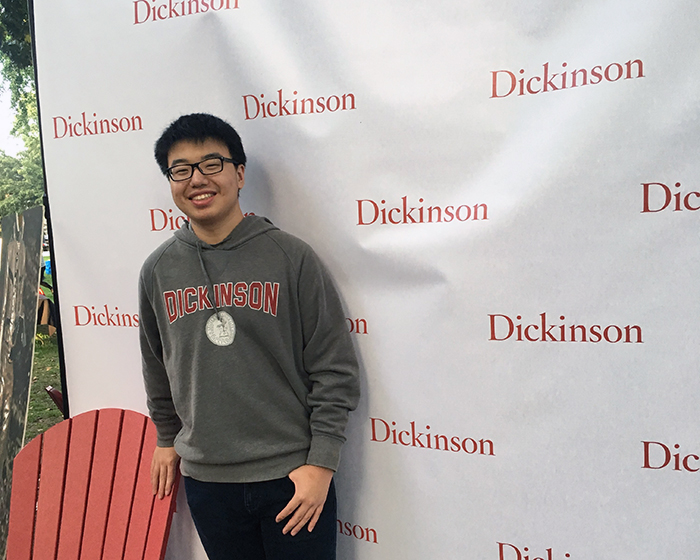Student Snapshot: Tao Xu ’21

“I chose Dickinson because this is truly a place of global culture and education, where every student has the space to accomplish great things. Dickinson’s liberal-arts education is realistic and hands-on, allowing us to apply our knowledge to solve real-world issues,” says Tao Xu ’21, a biochemistry & molecular biology and neuroscience double major with a chemistry minor who’s served high-level internships at two medical colleges. He’s also found time to work as a tour guide, serve in Student Senate and get involved with Chinese Students and Scholars and the Pre-health Society— all while serving as a volunteer at the UPMC Carlisle Hospital Emergency Room.
Hometown:
Yangzhou, China.
Majors:
Biochemistry & molecular biology and neuroscience, with a chemistry minor.
Clubs and organizations:
Student Senate, Liberty Cap tour guides, Chinese Students and Scholars Association (CSSA), Pre-Health Society, We Introduce Nations at Dickinson (WIND) and UPMC Carlisle Hospital Emergency Room volunteer.
Honors/scholarships/awards:
Forney P. George Scholarship for Humanistic Medicine, John Montgomery Scholarship & International Student Grant, Dean’s List and Sigma Alpha Pi.
Favorite book:
The Three-Body Problem by Cixin Liu.
Favorite movie:
Cloud Atlas.
The best thing about my Dickinson experience:
I’ve met a bunch of great friends and faculty members here who always encourage me. I also feel great contributing to the Dickinson community by representing students through Student Senate and by introducing the college’s history and achievements to prospective students and parents during tours.
On choosing a major:
Ever since high school, I’ve been fascinated by the seemingly infinite processes of moving from a single cell to an ecosystem and the delicate processes at each stage that make the life pyramid functional. So I chose a biochemistry and neuroscience double major to understand what life is and how life functions from a molecular to evolutionary perspective. And I can apply such knowledge in neuroscience to understand how cells work to make us think as humans. Combining the two majors also provides me with the ability to study complex modern health issues, such as cancer and Alzheimer’s disease.
As I kid, I wanted to be …
… an archaeologist.
On choosing Dickinson:
I chose Dickinson because this is truly a place of global culture and education, a place where every student has the space to accomplish great things. And Dickinson also offers a liberal-arts education that is more realistic and hands-on than other programs, allowing us to apply our knowledge to solve real-world issues.
Favorite Dining Hall food:
Steak & tofu rice noodle bowl.
About my internships:
So far, I have interned at the University of Alabama at Birmingham School of Medicine (UAB) and at the University of Massachusetts School of Medicine (UMass). At UAB, I researched acute lung injury in Ding’s Lab at Division of Pulmonary, Allergy and Critical Care Medicine and learned many graduate-level cellular biology research methods. And as a clinical assistant in UMass Psychotic Disorder Research Program, I gained clinical exposure in psychiatry, maintained programs’ social media and community/patient outreach, and also did some public health research. The two internships so far have provided me a good taste of a medical career from both laboratory and clinical perspectives.
If I could have dinner with anyone, living or dead, it would be …
… Jack Ma, co-founder of Alibaba Group.
Post-Dickinson plans:
I intend to pursue Ph.D. or M.D. in medical/clinical science.
Most important thing I’ve learned so far:
Always check labels and pipet volumes before you put that thing into a test tube. (That’s supposed to be a joke.)
About my research:
During my UAB internship, I helped investigate Neuronal Wiskott–Aldrich Syndrome protein (NWASP) regulation on endothelial permeability in acute lung injuries (ALI). I successfully demonstrated that NWASP’s knockdown effectively reduced endothelial permeability in cells together with Professor Qiang Ding’s team. The greater research project provides important biological foundation for further translational studies on clinically reducing edema formation, which is a critical lethal stage during ALI. Through this research experience, I developed valuable laboratory skills and experience and a better understanding of laboratory research in the medical field.
Also as a clinical research intern at UMass, I laid groundwork for the program’s public health review on the current situation of community-based mental health services in China. Through this research, I learned foundational knowledge about community healthcare in psychiatry as well as some epidemiology and public-health knowledge. I also did student-faculty research in the Dickinson biology department on mevalonate kinase deficiency (MKD) in autoinflammatory diseases during the summer of my junior year. This project aims to characterize the release of cellular vesicles during MKD in a model of the autoinflammatory disease, and results will contribute to our understanding of the basic biology behind autoinflammation’s relation with cholesterol pathway products. The project will last until the end of my senior year, and I aim to complete it as my senior honor thesis for my biochemistry major.
Advice for Other International Students:
Read more Student Snapshots.
TAKE THE NEXT STEPS
Published January 27, 2021